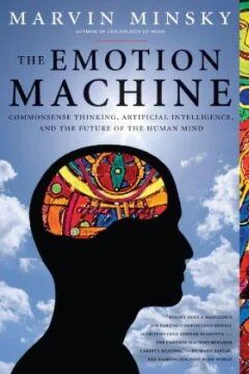—Oxford English Dictionary
Yet even this conception of love is too narrow to cover enough, because Love is a kind of suitcase-like word, which includes other kinds of attachments like these:
The love of a parent for a child.
A child’s affection for parents and friends.
The bonds that make lifelong companionships.
Attachments of members to groups or their leaders.
We also apply that same word ‘love’ to our fondness for objects, events, and beliefs.
A convert’s adherence to doctrine or scripture.
A patriot’s allegiance to country or nation.
A scientist’s passion for finding new truths.
A mathematician’s devotion to proofs.
We thus apply ‘love’ to our likings for things that we treasure, desire, or fill us with pleasure. We apply it to bonds that are sudden and brief, but also to those that increase through the years. Some occupy just small parts of our minds, while others pervade our entire lives.
But why do we pack such dissimilar things into a single suitcase-like word? It’s the same for our other ‘emotional’ terms; each of them abbreviates a diverse collection of mental states. Thus Anger may change our ways to perceive, so that innocent gestures get turned into threats, and it alters the ways that we react, to lead us to face the dangers we sense. Fear too affects the ways we react, but makes us retreat from dangerous things (as well as from ones that might please us too much).
Returning to the meanings of ‘ Love ’, one thing seems common to all those conditions: each leads us to think in different ways:
When a person you know has fallen in love, it’s almost as though someone new has emerged—a person who thinks in other ways, with altered goals and priorities. It’s almost as though a switch had been thrown, and a different program has started to run.
This book is mainly filled with ideas about what could happen inside our brains to cause such changes in how we think.
∞∞∞∞∞∞∞∞∞∞∞∞∞∞∞∞∞∞∞∞
§1-2. The Sea Of Mental Mysteries
Every now and then we dwell on questions about how we manage ourselves.
Why do I waste so much of my time?
What determines whom I’m attracted to?
Why do I have such strange fantasies?
Why do I find mathematics so hard?
Why am I afraid of heights and crowds?
What makes me addicted to exercise?
But we can’t hope to understand such things without adequate answers to questions like these:
How do our minds build new ideas?
What are the bases for our beliefs?
How do we learn from experience?
How do we manage to reason and think?
In short, we’ll need to get better ideas about the processes that we call thinking . But whenever we start to think about this, we encounter yet more mysteries.
What is the nature of Consciousness?
What are feelings and how do they work? How do our brains Imagine things?
How do our bodies relate to our minds?
What forms our values, goals, and ideals?
Now, everyone knows how Anger feels—or Pleasure, Sorrow, Joy, and Grief —yet as Alexander Pope suggests in his Essay on Man, we still know almost nothing about how those processes actually work.
“Could he, whose rules the rapid comet bind,
Describe or fix one movement of his mind?
Who saw its fires here rise, and there descend,
Explain his own beginning, or his end?”
How did we manage to find out so much about atoms and oceans and planets and stars—yet so little about the mechanics of minds? Thus Newton discovered just three simple laws that described the motions of all sorts of objects, Maxwell uncovered just four more that explained all electro-magnetic events—and Einstein then reduced all those laws into yet smaller formulas. All this came from the success of those physicists’ quest: to find simple explanations for things that, at first, seemed extremely complex .
Then, why did the sciences of the mind make less progress in those same three centuries? I suspect that this was largely because most psychologists mimicked those physicists, by looking for equally compact solutions to questions about mental processes. However, that strategy never found small sets of laws that accounted for, in substantial detail, any large realms of human thought. So this book will embark on the opposite quest: to find more complex ways to depict mental events that seem simple at first!
This policy may seem absurd to scientists that have been trained to believe such statements as, “One should never adopt hypotheses that make more assumptions than they need.” But it is worse to do the opposite—as when we use ‘psychology words’ that mainly hide what they try to describe. Thus, every phrase in the sentence below conceals its subject’s complexities:
You ‘look at an object and see what it is.
For, ‘look at’ suppresses your questions about the systems that choose how you move your eyes. Then, ‘object’ diverts you from asking about your visual systems partition a scene into various patches of color and texture—and then assign them to different ‘things.’ And, ‘see what it is’ sidesteps all the questions you could ask about how that sight might be related to other things that you’ve seen in the past.
It is much the same for the commonsense words that we usually use to talk about what our own minds do, as when one makes a statement like, “I think I understood what you said.” For perhaps the most extreme example of this is how we use words like Me and You —because we all grow up with this fairy-tale:
We each are constantly being controlled by powerful creatures inside our minds, who do our feeling and thinking for us, and make our important decisions for us. We call these our Selves or Identities—and believe that they always remain the same, no matter how we may otherwise change.
This “Single-Self” concept serves us well in our everyday social affairs. But it hinders our efforts to think about what minds are and how they work—because, when we ask about what Selves actually do, we get the same answer to every such question:
Your Self sees the world by using your senses. Then it stores what it learns in your memory. It originates all your desires and goals—and then solves all your problems for you, by exploiting your ‘intelligence.’

A Self controlling its Person’s Mind
What attracts us to this queer idea, that we don’t make any decisions ourselves but just delegate them to something else? Here are a few kinds of reasons why a mind might entertain such a fiction:
Child Psychologist: Among the first things you learn to recognize are the persons in your environment. In your next stage, you should assume that you are also a person, too. But perhaps it is easier to conclude that there is a person inside of you.
Therapist: Although it’s a legend, it makes life more pleasant—by keeping us from seeing how much we’re controlled by conflicting, unconscious goals.
Pragmatist: That image makes us efficient, whereas better ideas might slow us down. It would take too long for our hard-working minds to understand everything all the time.
Читать дальше













